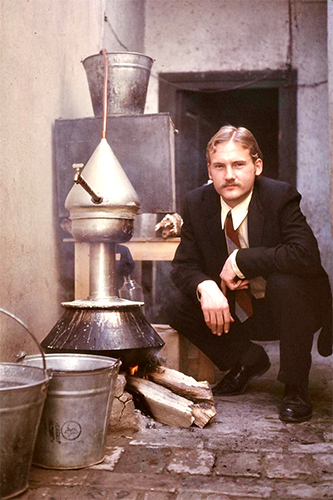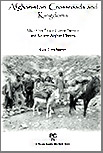Guy Toby Marion (Afghanistan) offers look at ’70s Peace Corps service
RPCVs in the news
By Colleen Bidwill cbidwill@marinij.com
Marin Independent Journal April 1, 2024
• • •

Tiburon, CA resident Guy Toby Marion distills arak
When Guy Toby Marion joined the Peace Corps in 1971, it wasn’t his first choice to go to Afghanistan. In fact, the 22-year-old — whose previous travels were mainly family vacations to Mexico — wanted to go to South America to learn Spanish fluently.
“I had a mentor in my college days who was from India,” he says. “I called him up and he said that the history of Afghanistan with Russia and India and all throughout from ancient times is fascinating. I was kind of swayed by that.”
He took a position working as a high school science teacher trainer in Kapisa province, which he did for two school years, before teaching for three semesters on the faculty of engineering at Kabul University.
He reflects on his experiences, from making moonshine out of fermented raw molasses and raisins to hiking more than three weeks in the Hazarajat mountains to learn Farsi, and experiencing the country’s culture, to being there in 1973 during the coup d’etat against Afghan King Mohammad Zahir Shah, in his new book, Afghanistan: Crossroads and Kingdoms.” He also reflects on the country’s complex past, such as the Soviet invasion in 1979, and more recently, the involvement of the United States government and NATO.
Hear him speak about his work on Thursday, April 7, at 7 p.m. at the Corinthian Yacht Club at 43 Main St. in Tiburon. Admission is free. Walk-ins are welcome, but reservations are recommended by emailing speakers@cyc.org.
Q Why did you join the Peace Corps?
In December 1969, President Richard Nixon introduced a draft lottery. I got a high number, which meant that in 1970, which is the year I graduated from college, I suddenly was out of the draft. I was reclassified, so there was really no chance I was going to be drafted into the Vietnam War, so I got a master’s degree, and when I came out in ’71, I had some good job offers. But the ’60s was a time of great turbulence, the war in Vietnam, the civil rights movements, the women’s movements. I wasn’t quite ready to join the establishment at that stage. We were all pretty upset about the Vietnam War, and about trusting governments. But I wanted to serve the country and felt the duty to do so, so I joined the Peace Corps.
Q How was the transition?
We had our training in Kabul. Being a teacher or a teacher trainer, we needed a lot of language. We learned Farsi 9 a.m. to 5 p.m. five days a week, most weeks. And then we also had a number of trips, one which was on our own. You got a small chunk of cash and you chose a place to go. I went north of the Hindu Kush mountains, which is about a 15-hour bus ride. You hang out in a local village, where there’s nobody who speaks English and nobody there to help you. By the time the four months is over, you’ve had a pretty comprehensive review or look at the country, although your language skills are very weak. By the time I was working at Kabul University, I spoke the language fluently and I loved the life in the country.
Q How did you want to approach this book?
My mother saved all my letters and made copies of them, which she gave to me in a big folder when I came back in the late ’70s. I started typing up those letters and created a timeline. Then, I filled in a lot of details from my diaries and later started talking to friends. When the war kept going on, at some point, I said, I really should be doing this. In 2021, when we pulled out, I came to the realization that really to finish this book, I needed to know a lot more than I did know, so I started doing research and reading books.
Henry Kissinger had been there in November 1974, just three months before I left. And the ambassador, Ted Elliott, had kindly invited us to the embassy to meet Kissinger. We met with him on the steps, and I couldn’t remember anything about that meeting.
I assume that we talked about the Vietnam War because that’s what we were mostly interested in. I went on the Internet and found the verbatim transcript of Kissinger’s meeting with the Ministry of Foreign Affairs.
I realized that the world is much more complicated than we Peace Corps volunteers thought at the time. I wrote the book to share with my family, to learn more about what really happened and because I feel a need to say something.
I feel that if you’re going to try to make a difference in this world, the best way to do that is through peaceful development, trading, business and manufacturing.
Q You met your wife in Bahrain and a lot of your work was abroad. Did that experience help spark your love of traveling?
Yeah, that set it off. When I came back, one of my good friends said, “I’m never going to leave America again.” And what I said was, “I’m going international. I want to be out there.” I ended up joining an oil company because I had chemical engineering degrees and then later the wine business. I worked in Bahrain, Australia, Japan, Thailand and Hong Kong.
Q How else did the experience impact you?
It gave me a fairly broad perspective on life. And seeing things through the eyes of another culture, another language teaches you that there’s not one way to think about a problem.

Thanks Guy–I bought and read your book with relish and joy. what a truly amazing place was your Afghanistan—so sad that it is now forever gone. Thanks for writing the book.
When five of us Peace Corps volunteers in cycle 11 first arrived in Afghanistan as trainees in November 1971, we disembarked on the tarmac and walked a short distance to the terminal. There was a caravan of black limousines parked at the terminal. We joked that the caravan must be for us, to take us to Peace Corps headquarters. Actually it was there to receive an American dignitary disembarking from a different plane at the same time. Do I remember correctly that the dignitary was Henry Kissinger, dropping in after visiting the Shah of Iran to explain the socalled Nixon doctrine?